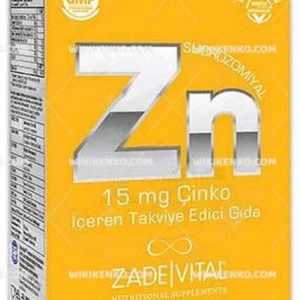Zentius D Chewable Tablet
In this comprehensive guide, we delve into the world of Zentius D Chewable Tablet, a medication designed to address various health conditions. From its active ingredients to usage instructions, potential side effects, and considerations during pregnancy, we cover it all to provide you with a comprehensive understanding of this medication.
| Dosage form | |
|---|---|
| Pack size | |
| Potency | Combined |
| Manufacturer | |
| Origin | |
| Generic Name (Ingredient) | In Each Chewing Tablet; Calcium Carbonate 1500 Mg (Equivalent To 600 Mg Calcium) Cholecalciferol (Vitamin D3) 400 I.U. (Equivalent To 0.01 Mg) |
Assuming your emergency circumstances for this product, visit Urgent Quotation page. Besides, for any pharmaceutical questions, please ask us in the comments section.
Description
Zentius D Chewable Tablet is a versatile medication indicated for specific health requirements. These include scenarios such as increased calcium demand during pregnancy and lactation, support for children and adolescents during rapid growth phases, addressing calcium deficiencies resulting from malnutrition, and the prevention and treatment of conditions like osteoporosis, disorders of osteogenesis, and latent tetany.
Active Ingredients
Calcium Carbonate: A Vital Component
One of the key active ingredients in Zentius D Chewable Tablet is Calcium Carbonate. This compound plays a pivotal role by reacting with gastric acid to produce a salt and water. Its acid-neutralizing capacity is measured at 58 mEq/15 ml. When used as a nutritional supplement, Calcium Carbonate directly contributes to bolstering calcium stores within the body.
Dihydrotachysterol: An Essential Synthetic Analog
Dihydrotachysterol, another active ingredient, stands as a synthetic analog of vitamin D. Unlike vitamin D2 or Vitamin D3, it doesn’t rely on renal activation. Instead, Dihydrotachysterol effectively elevates serum calcium levels by stimulating intestinal calcium absorption and mobilizing bone calcium, even in the absence of parathyroid hormone and functioning renal tissue. Additionally, it aids in increasing renal phosphate excretion.
Versatile Applications
Zentius D Chewable Tablet serves a wide range of purposes in the realm of healthcare. Its applications encompass:
- Prevention and Treatment of Rickets and Osteomalacia: Addressing these conditions effectively.
- Managing Hypocalcemia: Especially when associated with hypoparathyroidism or pseudohypoparathyroidism.
- Vitamin D Dependent Rickets: Offering relief in such cases.
- Osteoporosis Management: Often used in conjunction with calcium.
- Hypophosphatemia in Fanconi Syndrome: Particularly when addressing acidosis.
Dosage Guidelines
For adults, the recommended dosage typically ranges from 540-2000 mg of Calcium Carbonate per day. In the case of children, the dosage is typically half that of adults. When employed as a dietary supplement for osteoporosis prevention, a range of 1250-3750 mg of Calcium Carbonate (500-1500 mg) is commonly advised.
Side Effects
As with any medication, Zentius D Chewable Tablet may lead to side effects, although they do not affect everyone. Here are some potential side effects to be aware of:
Serious Side Effects
While rare, some individuals may experience severe and occasionally life-threatening side effects. In such instances, it is imperative to seek immediate medical attention if any of the following signs or symptoms occur:
- Signs of an allergic reaction, including skin reactions, breathing difficulties, or swelling.
- Severe constipation.
Other Side Effects
It’s important to note that all drugs may induce side effects, although many individuals experience none or only minor effects. If any side effects, including upset stomach, vomiting, or constipation, trouble you or persist, consulting a healthcare provider is advisable.
Considerations During Pregnancy
The safety of Zentius D Chewable Tablet during pregnancy is not explicitly mentioned in the sources available. It is crucial to meticulously evaluate every medication, including over-the-counter options and natural supplements, to ascertain their safety during pregnancy. This scrutiny is particularly vital during the first trimester, a critical phase in embryo and fetus development.
While most medications are generally safe for lactating mothers and do not harm breastfeeding infants, some medications must be avoided, including cytotoxic agents, lithium, radiopharmaceuticals, and retinoids.
Always consult your healthcare provider or specialist for advice regarding medication use during pregnancy or while breastfeeding. They can offer a comprehensive assessment of your medication profile and provide guidance on potential interactions and safety during these critical periods.
Conclusion
Zentius D Chewable Tablet stands as a versatile solution for various health conditions, thanks to its active ingredients, Calcium Carbonate and Dihydrotachysterol. While its applications range from preventing rickets to managing osteoporosis, it is essential to be aware of potential side effects and exercise caution during pregnancy and lactation. Consulting a healthcare provider for personalized guidance is strongly recommended, ensuring that your medication usage aligns with your unique healthcare needs.
Key Information
| Aspect | Information |
|---|---|
| Active Ingredients | Calcium Carbonate and Dihydrotachysterol |
| Indications | Various, including rickets, osteoporosis, and more |
| Recommended Dosage | Adult: 540-2000 mg Calcium Carbonate per day; Child: Half of adult dosage; For osteoporosis prevention: 1250-3750 mg Calcium Carbonate (500-1500 mg) |
| Potential Side Effects | Including allergic reactions, constipation, upset stomach; Contact healthcare provider for persistent or bothersome side effects |
| Pregnancy and Breastfeeding | Consult healthcare provider for safety information |
Use the form below to report an error
Please answer the questions as thoroughly and accurately as possible. Your answers will help us better understand what kind of mistakes happen, why and where they happen, and in the end the purpose is to build a better archive to guide researchers and professionals around the world.
The information on this page is not intended to be a substitute for professional medical advice, diagnosis, or treatment. always seek the advice for your physician or another qualified health provider with any questions you may have regarding a medical condition. Always remember to
- Ask your own doctor for medical advice.
- Names, brands, and dosage may differ between countries.
- When not feeling well, or experiencing side effects always contact your own doctor.
Cyberchondria
The truth is that when we’re sick, or worried about getting sick, the internet won’t help.
According to Wikipedia, cyberchondria is a mental disorder consisting in the desire to independently make a diagnosis based on the symptoms of diseases described on Internet sites.
Why you can't look for symptoms on the Internet
If diagnoses could be made simply from a textbook or an article on a website, we would all be doctors and treat ourselves. Nothing can replace the experience and knowledge of specially trained people. As in any field, in medicine there are unscrupulous specialists, differences of opinion, inaccurate diagnoses and incorrect test results.






Reviews
There are no reviews yet.